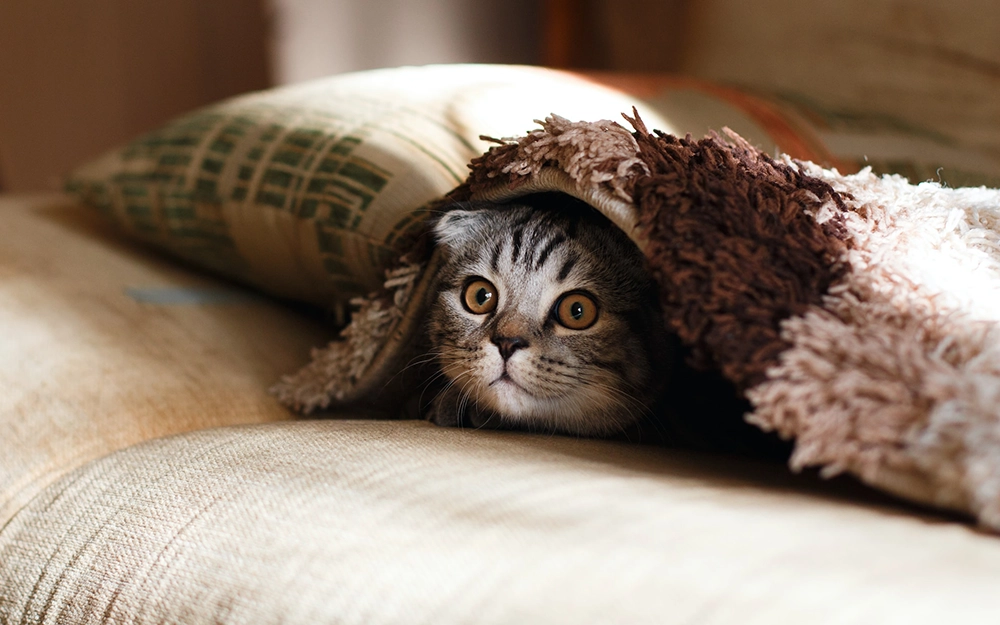Cats are incredibly hardy pets that are easy to care for. In most cases, just give a cat access to plenty of fresh water and quality food, a litter pan, regular wellness visits to the vet, and of course some love, and that cat will be living a life of luxury.
But as long-lived as most cats are, there will be times when your cat might feel under the weather. She may even develop a health problem or illness that requires more specialized medical attention and supportive care.
Whether you’re a new cat parent or you’ve lived with your cat for years, it’s important to know which health problems your cat will be most at risk of developing over the course of her life. Here are the eight most common cat health problems and illnesses to keep an eye out for.
Lower Urinary Tract Disease
Lower urinary tract disease is a common condition that is most pronounced in middle aged cats that are overweight, don’t get enough exercise, or live in stressful environments. Male cats tend to be more prone for this disease as their urinary tract is narrower than females. Symptoms include:
- Painful urination
- Straining to urinate
- Increased urination
- Urinating outside of the litter box
- Excessive licking
Upper Respiratory Infection
An upper respiratory infection is any infection that affects your cat’s nose, throat, or mouth. These can be a bacterial or fungal infection, or a virus. In 90% of feline upper respiratory infections, the cause is either the feline herpesvirus or calicivirus. Chlamydophila, mycoplasma, and bordetella are also possibilities, but they’re nowhere near as common.
Upper respiratory infection symptoms tend to look pretty similar to those when you have a cold and typically last for seven to ten days. They include:
- Congestion
- Sneezing and coughing
- Eye and nose discharge
- Fever
- Lethargy
- Loss of appetite
- Mouth ulcers
Worms
Worms are parasites that can cause a wider range of health complications, and cats can pick them up in a variety of ways. For instance, cats can get worms by eating fleas, coming into contact with a dead animal, tick bites, ingesting parasite eggs in soil, from mosquitos, from infected dog feces, and more. Kittens can even get worms from their mother’s milk. And there are several different types of worms that cats can get, such as roundworm, tapeworm, hookworm, whipworm, heartworm, and lungworm.
While each type of worm has certain symptoms that are exclusive to the parasite, the more universal symptoms include:
- Vomiting with or without visible worms
- Diarrhea with or without visible worms
- Swollen abdomen
- Dehydration
- Dull coat
- Weight loss
- Scooting
- Pale gums
- Coughing
Fleas
Fleas are so common on cats that even cats that never set foot outside can get them. The most common signs that your cat has fleas includes:
- Itching
- Excessive licking
- Bald spots
- Evidence of fleas (flea dirt)
Obesity
It’s not uncommon for house cats to gain weight because they aren’t outside hunting for their food or getting enough quality exercise indoors. Modern, commercially-made cat food also doesn’t help. In serious cases, a cat can become obese, which will open her up to a whole variety of other health problems, like heart problems or diabetes.
Diabetes
Diabetes is a common health problem in middle-aged and older, overweight cats. It is most associated with symptoms like excessive drinking, urinating more than usual, and weight loss, despite the cat having a good appetite. Most diabetic cats can be treated via a high-protein, low-carbohydrate diet that will help regulate their blood sugar, but other more serious cases will usually require insulin injections.
Dental Diseases
Dental diseases like gingivitis, periodontitis, and tooth resorption are surprisingly very common in cats. While a simple cleaning can often improve gingivitis, the latter two conditions often require more intensive treatments, including removal of the affected tooth or teeth.
Most dental diseases present similar symptoms, including:
- Bad breath
- Drooling
- Loss of appetite or difficulty eating
- Missing or loose teeth
- Discolored teeth
- Irritated gums
Cancer
You never want to hear the “c word” come out of your veterinarian’s mouth, but like humans, cats are also susceptible to cancer. The most common cancers diagnosed in cats include:
- Mammary cancer (breasts in females, belly and chest area in males)
- Fibrosarcoma (connective tissue)
- Lymphoma (lymph nodes)
- Squamous Cell Carcinoma (mouth and skin)
While each type of cancer exhibits its own distinct symptoms, some of the more generalized symptoms can include:
- Weight loss
- Lethargy
- Bad odor
- Lameness
- Bleeding
- Sores that won’t heal
- Lumps
- Difficulty eating
- Difficulty going to the bathroom
Think Your Cat is Sick? Get Her to the Vet ASAP
Any time your precious cat shows signs of being sick, it can be especially worrying. But because so many common cat illnesses present similar symptoms, you should never try and self-treat your pet. It is always best to take your cat to the veterinarian, so the proper tests and examinations can be performed and the right diagnosis made.
If your cat isn’t acting like herself, or is exhibiting any of the symptoms listed above, then contact your veterinarian immediately. The quicker treatment is administered, the happier your cat will be.

